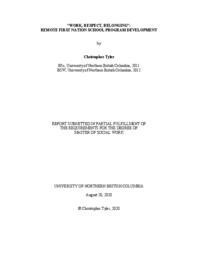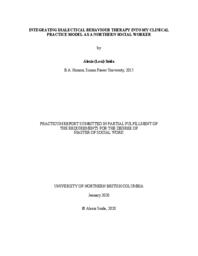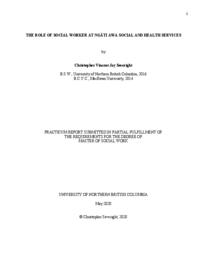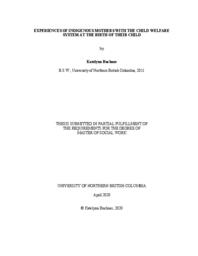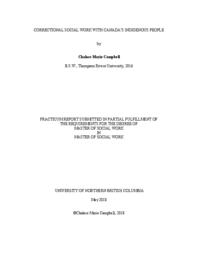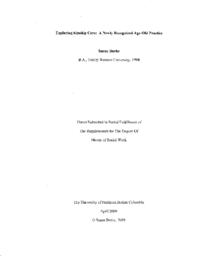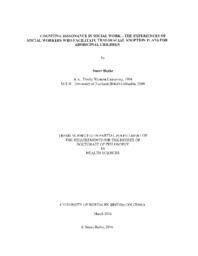Burke, Susan
Person Preferred Name
Susan Burke
Related Works
Content type
Digital Document
Description / Synopsis
This report summarizes my practicum experience at Aatse Davie School in Fort Ware, British Columbia, on the traditional territory of the Kwadacha Nation. This K-12 school is located in one of the most remote areas in British Columbia and has approximately 100 students. I expanded and developed senior and junior boys’ groups, while also exploring program development as a social worker in a remote school location. My practicum firstly introduced electronics to these students as part of a STEM extracurricular activity and secondly explored areas of Indigenous masculinity. This report explores my practicum goals, accomplishments, and learnings, and then concludes with suggestions for future social workers and contributions to social work practice which emerged from my learning as part of my practicum experience.
Origin Information
Content type
Digital Document
Description / Synopsis
A Master of Social Work practicum at Walmsley and Validity Counselling was completed in support of my desire to advance my general clinical skills and integrate Dialectical Behaviour Therapy (DBT) into my personal practice model. This report begins with a placing of self and localization of practice considerations to northern British Columbia. A literature review on DBT is provided as context for reflection on my learning goals, which explore topics of professional drift, private versus non-profit organization models, northern practice considerations, component versus comprehensive DBT practice, and the cultural safety of mindfulness and acceptance-based therapies. The wisdom and skills gained from this experience, particularly the integration of DBT-informed therapy into my personal practice model, are reviewed in chapters on learning outcomes and implications for practice. This practicum resulted in a strong desire to continue to practice emotion and family focused social work in Prince George, British Columbia.
Origin Information
Content type
Digital Document
Description / Synopsis
This report provides an overview of my practicum placement with a non-profit organization, Carrier Sekani Family Services (CSFS), in particular its Health and Wellness Program. Most of my placement was at Ormand Lake Cultural Healing Camp, known in Carrier language and within the Carrier nations as Choostl’o Bunk’ut. CSFS serves 11 Carrier First Nations bands in north central British Columbia. The objective of my practicum was to gain competency working with Indigenous peoples and their communities and to understand Indigenous wellness from the perspective of the Carrier people. Overall, this practicum helped me to explore my interest in Indigenous mental health and traditional healing. This report will discuss my experiences as a practicum student and will explore how culture can be used for healing in mental health. Several topics that emerged in relation to my practicum goals will be outlined, including ethics and boundaries, spirituality, clinical and alternative practice skills, and integrating Indigenous and Western approaches.
Origin Information
Content type
Digital Document
Description / Synopsis
The intention of this practicum report is to provide a further understanding of the social worker’s role at Ngāti Awa Social and Health Services in Whakatāne, New Zealand. Ngāti Awa Social and Health Services provided me with a unique learning opportunity to explore the importance of a Māori framework within their programs on a rotational basis such as: Iwi Social Services, Rangiatea (i.e. Teen Parent Unit), and Te Waipuna Ariki o Matangireia ECE (i.e. Early Child Education). This report will provide an emphasis and understanding of the importance of incorporating Māori culture, and teachings within their agency framework at Ngāti Awa Social and Health Services. This practicum was a unique venture to be included as part of the Cross-Cultural Indigenous Knowledge Exchange (CCIKE) program. The practicum was only possible with multiple organizations coming together to consult, collaborate, and communicate. The following organizations were involved: University of Northern British Columbia (UNBC), UNBC First Nations Department, Te Whare Wānanga o Awanuiārangi, UNBC Master of Social Work program, and Queen Elizabeth II Diamond Jubilee Scholarship. This practicum opportunity represented the first collaboration with the Master of Social Work program and the Māori organizations. This experience allowed me to set specific learning goals in the following areas: professional practice, education development, cultural competency, cross-cultural experience, the ability to challenge oneself (i.e. out of my own comfort zone), and be an active participant in cultural events. This report will include a detailed description of the agency, theoretical frameworks/model, observations, research, critical reflection, hands-on experience, and an understanding of how Māori integrated programming improves health outcomes for Māori Whānau.
Origin Information
Content type
Digital Document
Description / Synopsis
The topic of Indigenous women’s experiences with the Ministry of Children and Family Development (MCFD) at the birth of their child is one that falls through the gaps of current literature. This thesis is focused on identifying the experiences of Indigenous women when MCFD intervenes at the birth of their child; the purpose is to gain insight into the strengths and weaknesses of child welfare interventions. I interviewed five Indigenous women using an interpretive description approach and analyzed the data using constant comparative analysis as well as conventional content analysis techniques. The findings highlighted the impact of child welfare involvement that included: powerful emotions, trust, communication and dismantled families; a structural power imbalance characterized as feeling powerless, being watched and judged, and jumping through hoops; addiction; socioeconomic struggles that included young mothers and homelessness, poverty, and neglect; missed preventative opportunities; the role of advocacy; identity and culture; and bonding. In conclusion, child welfare practice needs to include opportunities for preventative measures and planning to optimize support and communication with Indigenous pregnant women and mothers.
Origin Information
Content type
Digital Document
Origin Information
Content type
Digital Document
Origin Information
Content type
Digital Document
Origin Information

